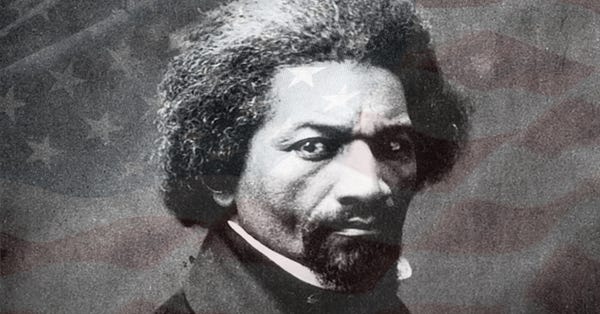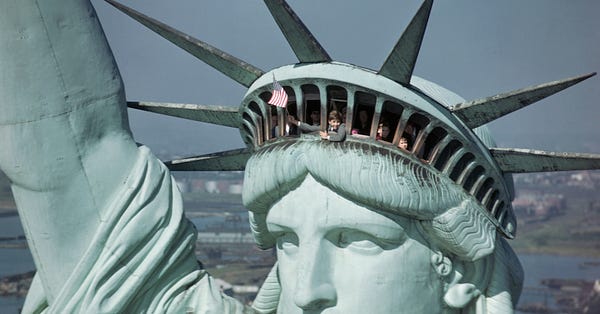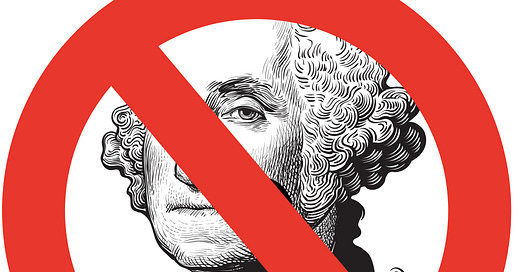E-Pluribus | July 5, 2022
George Washington's days may be numbered, "inclusive" language is taking more friendly fire, and biology matters.
A round-up of the latest and best writing and musings on the rise of illiberalism in the public discourse:
Allen C. Guelzo: Cancel Culture Goes to Washington
During the 2020 round of Let’s Tear Down Statues, New York Times columnist Charles Blow said in answer to his own hypothetical about taking down monuments to George Washington, “abso-fricking-lutely!” Blow might take issue therefore with Allen Guelzo’s Wall Street Journal op-ed defending the name of George Washington University, not for its namesake’s inexcusable actions as a slave owner, but for his visionary and principled leadership that helped put the country on the path to ending that odious institution.
George Washington certainly did own slaves. In addition to the 10 he inherited from his father, he accumulated another 65 through outright purchase over the years. When he married Martha Dandridge Custis in 1759, she brought another 84 slaves to the household at Mount Vernon. By 1786 the slaves numbered 216. In 1799, the last year of his life, Washington owned 317 men, women and children. Even in the years Washington served as the first president, he kept at least eight slaves in his home in the first capitals, New York and Philadelphia.
[ . . . ]
Yet Washington’s time was also the Age of Enlightenment, when the classical hierarchies of the physical and political worlds were overthrown, to be replaced by the natural laws of gravity and the natural rights of “Nature and Nature’s God,” as the Declaration of Independence put it. Labor ceased to be a badge of subservience, and commerce became admirable. As commerce and labor gave people a greater sense of control over their lives for the first time in human history, slavery came to be seen as repugnant and immoral.
[ . . . ]
So, yes, George Washington owned slaves, and his turn against slavery happened slowly. But this isn’t the only matter to enter into the historical calculus of blame or fame. Washington was fumbling toward the elimination of slavery in an America that was only just emerging from centuries of deeming slavery normal. He was also the indispensable man of a rebellion that began the movement toward ending slavery. Once that government was established, he frankly told Edmund Randolph that if the slaveholding states of the South persisted in wrecking the new republic, “he had made up his mind to remove and be of the Northern” states. Frederick Douglass, in his most famous speech, praised Washington as the man who “could not die till he had broken the chains of his slaves.”
Read it all here.
Pamela Paul: The Far Right and Far Left Agree on One Thing: Women Don’t Count
Pamela Paul joins a growing list of not-by-any-means conservatives who take issue with “inclusive” language that actually undermines women and the progress made on women’s rights. Paul writes in the New York Times that women should not be sacrificed for the sake of a “relatively tiny number” of people who have managed to hijack gender for their own ends.
The noble intent behind omitting the word “women” is to make room for the relatively tiny number of transgender men and people identifying as nonbinary who retain aspects of female biological function and can conceive, give birth or breastfeed. But despite a spirit of inclusion, the result has been to shove women to the side.
Women, of course, have been accommodating. They’ve welcomed transgender women into their organizations. They’ve learned that to propose any space just for biological women in situations where the presence of males can be threatening or unfair — rape crisis centers, domestic abuse shelters, competitive sports — is currently viewed by some as exclusionary. If there are other marginalized people to fight for, it’s assumed women will be the ones to serve other people’s agendas rather than promote their own.
But, but, but. Can you blame the sisterhood for feeling a little nervous? For wincing at the presumption of acquiescence? For worrying about the broader implications? For wondering what kind of message we are sending to young girls about feeling good in their bodies, pride in their sex and the prospects of womanhood? For essentially ceding to another backlash?
Women didn’t fight this long and this hard only to be told we couldn’t call ourselves women anymore. This isn’t just a semantic issue; it’s also a question of moral harm, an affront to our very sense of ourselves.
Read it all.
Kate Miechkowski: Male Bodies Don’t Belong in Female Football
At Quillette, Kate Miechkowski writes as a long-time football player herself — first as a young girl playing with boys and later as an adult in a women’s football league — that rough and tumble sports are no place to mix biological women with males. Though sympathetic to the issues transgender people face, Miechkowski says biological differences cannot be glossed over and real physical dangers exist and are being wrongly downplayed in the name of social justice.
Until recently, the things I am saying here were considered unsayable (at least in polite society). Such assertions of biological reality were denounced as an affront to the principle that transgender rights “aren’t up for debate.”
But such absolutist slogans are losing their force, thanks in part to the backlash produced by Thomas’s performance at the NCAA swimming finals in March. A sign of the times is the recent ruling from the Fédération Internationale de Natation (FINA), swimming’s global governing body, to the effect that biological males who describe themselves as trans women (such as Thomas) won’t be allowed to compete in elite women’s swim races if they’ve already gone through any part of male puberty. The global body that oversees rugby union made a similar ruling in 2020. And track and field seems to be heading in the same direction.
None of these developments signal real transphobia any more than do my own views. I believe that transgender people have rights. But I also believe that, as in many other spheres of law and policy-making, there are trade-offs to be made between the rights asserted by different groups. It’s a lesson I learned the hard way as a child: The boys had their own football team while the girls didn’t, because there simply weren’t enough interested girls to justify the operation of a female league. Town resources are limited, and administrators have to make hard choices. It’s unfortunate, but I had to accept that. Being a girl who likes traditionally male activities put me in the minority, and so sometimes meant that I had to refrain from engaging in activities I enjoyed.
Read the whole thing.
Around Twitter
Via the Foundation Against Intolerance & Racism, a reminder of how Frederick Douglass had a clear-eyed view of America’s faults, yet didn’t lose hope for his country:




Bari Weiss published some thoughts from some writers and thinkers on her Substack Common Sense this holiday weekend, and Free Black Thought highlights Roland Fryer’s contribution:





And finally, when you’ve lost Bette Midler (screenshot, just in case she thinks better of it)…









